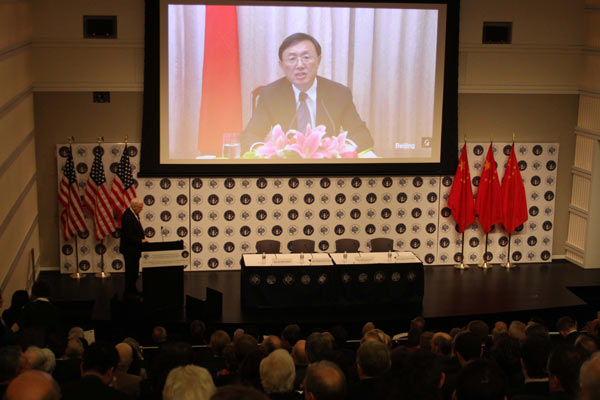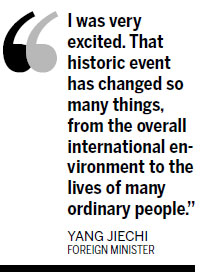Nixon's visit 'changed so many things'
Updated: 2012-03-09 07:24
By Chen Jia in Washington and Zhao Shengnan in Beijing (China Daily)
|
||||||||
FM: Historic event affected the lives of ordinary people
The 40th anniversary of US president Richard Nixon's landmark visit to China is highly regarded by diplomats and experts as a watershed moment in China-US relations, which now stand at a new starting point.
 |
|
Foreign Minister Yang Jiechi addresses a conference on China-US Relations, an event marking the 40th anniversary of US president Richard Nixon's visit to China, in Washington via video on Wednesday. [Sun Chenbei / China Daily] |
Thanks to concerted efforts from both sides, the China-US relationship is still moving forward and has grown into one of the most important bilateral ties in the world, despite some ups and downs, Foreign Minister Yang Jiechi said on Wednesday while addressing a conference on China-US Relations in Washington via video.
The conference was hosted by the United States Institute of Peace, the Richard Nixon Foundation and the Kissinger Institute on China and the United States, and marked Nixon's visit to China and the signing of the Shanghai Communiqu in 1972, which is considered a defining moment for China-US ties.
Yang, who was in his early 20s at the time, was about to leave China to study in the United Kingdom when he heard the news.
"I was very excited. That historic event has changed so many things, from the overall international environment to the lives of many ordinary people," he said.
|
|
US Secretary of State Hillary Clinton also recalled that she watched the developments every night during that "remarkable week" through a rented television.
Forty years later, Chinese cities have been transformed from "silence" 40 years ago to "noise and fast-pace 24-hour centers", while Nixon's visit was the start of China's entrance into the international realm and cooperative engagements with other nations, Clinton said.
"We are now trying to find an answer, a new answer to the ancient question of what happens when an established power and a rising power meet," she said.
"Interdependence means that one of us cannot succeed unless the other does as well. We need to write a future that looks entirely different from the past."
Chinese Ambassador to the US Zhang Yesui said that this relationship is not, and should not be, a zero-sum game relationship, and conflict and confrontation do not serve mutual interests.
"There is every reason to believe that if we manage our differences well, China and the US can establish a new model of relationship under which two big countries can coexist peacefully and develop together," he said.
There are now more than 60 mechanisms of dialogue in place between the US and China, including the Strategic and Economic Dialogues and the High-Level Consultation on People-to-People Exchange, according to Richard Solomon, president of the United States Institute of Peace.
"These mechanisms cover politics, the economy, security, culture and many other fields. Indeed, few other two countries can claim to have so many high-level dialogue mechanisms that cover such diverse fields," he said.
New frictions on security, especially the US' strategic shift in the Asia-Pacific region, and trade issues including intellectual rights and market access in China, call for both sides to seek a new model and strategic base for bilateral cooperation, said Fan Jishe, a researcher with the Chinese Academy of Social Sciences.
"While the US is more likely to view China as a competitor, Yang's words signaled that China would like to find out a proper way to coexist and cooperate with the US in the region," he said.
Contact the writers at Chenjia@chinadailyusa.com and zhaoshengnan@chinadaily.com.cn

 Relief reaches isolated village
Relief reaches isolated village
 Rainfall poses new threats to quake-hit region
Rainfall poses new threats to quake-hit region
 Funerals begin for Boston bombing victims
Funerals begin for Boston bombing victims
 Quake takeaway from China's Air Force
Quake takeaway from China's Air Force
 Obama celebrates young inventors at science fair
Obama celebrates young inventors at science fair
 Earth Day marked around the world
Earth Day marked around the world
 Volunteer team helping students find sense of normalcy
Volunteer team helping students find sense of normalcy
 Ethnic groups quick to join rescue efforts
Ethnic groups quick to join rescue efforts
Most Viewed
Editor's Picks

|

|

|

|

|

|
Today's Top News
Health new priority for quake zone
Xi meets US top military officer
Japan's boats driven out of Diaoyu
China mulls online shopping legislation
Bird flu death toll rises to 22
Putin appoints new ambassador to China
Japanese ships blocked from Diaoyu Islands
Inspired by Guan, more Chinese pick up golf
US Weekly

|

|







